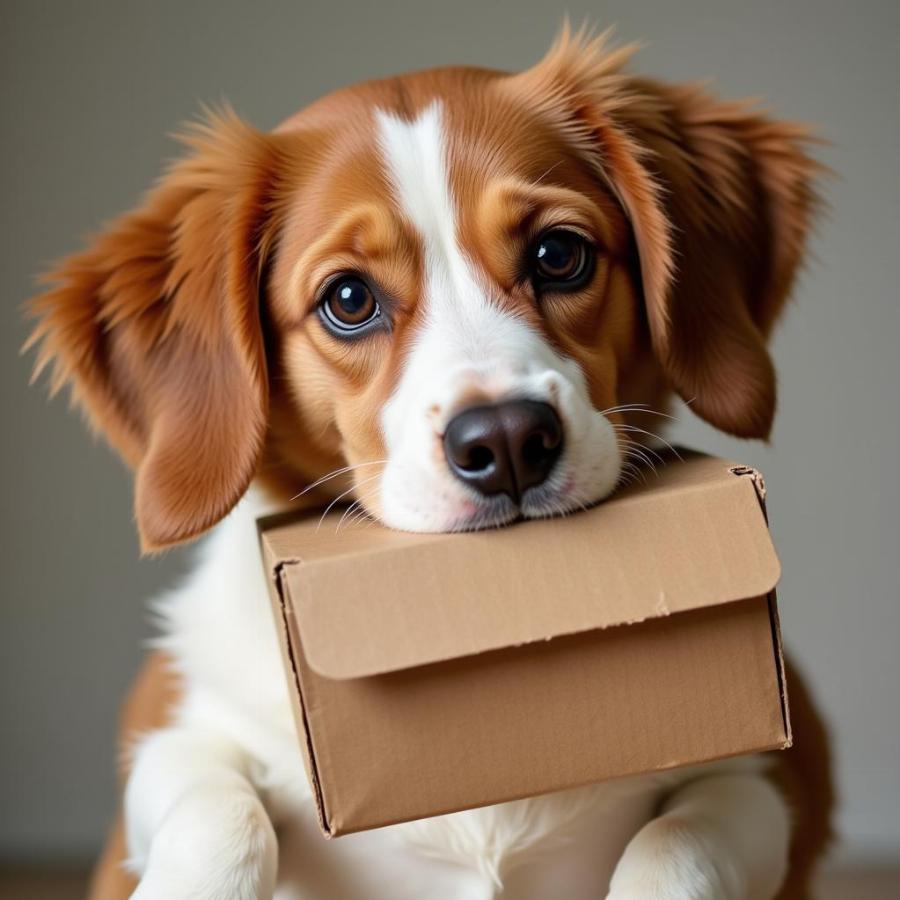We’ve all been there – your furry friend is eyeing that empty delivery box with an intensity that could rival a lion stalking its prey. Your dog’s tail wags hopefully, their eyes pleading for just a taste. But before you let them turn that cardboard into a chew toy, it’s crucial to ask: can dogs eat cardboard? The short answer is no. While cardboard itself isn’t inherently toxic to dogs, it poses several risks that every responsible owner should be aware of.
Why Cardboard is a No-Go for Your Canine Companion
While a little nibble on a cardboard box might seem harmless, it can lead to several health issues for your dog.
Digestive Upset
Cardboard, unlike dog food, doesn’t offer any nutritional value and is difficult for a dog’s digestive system to break down. Ingesting large amounts of cardboard can lead to gastrointestinal blockages, which can be life-threatening if left untreated.
 Dog Holding Cardboard Box in Mouth
Dog Holding Cardboard Box in Mouth
Choking Hazard
Cardboard, especially in large pieces, poses a choking hazard for dogs. They might try to swallow it whole, leading to choking or getting lodged in their throat or esophagus.
Toxic Substances
Cardboard boxes, particularly those used for shipping, often contain residues of ink, tape, glue, and other chemicals. These substances can be toxic to dogs if ingested, leading to vomiting, diarrhea, and other health problems.
Recognizing the Signs of Cardboard Trouble
It’s crucial to monitor your dog’s behavior and look out for any signs of distress, especially after they’ve been around cardboard boxes. Some common indicators of a problem include:
- Vomiting
- Diarrhea
- Loss of appetite
- Lethargy
- Abdominal pain
- Constipation
If you notice any of these signs, contact your veterinarian immediately.
Providing Safe and Enriching Alternatives
Dogs often chew on cardboard out of boredom or a natural instinct to gnaw. Instead of letting them munch on potentially harmful materials, provide them with safe and stimulating alternatives.
- Durable chew toys: Choose toys specifically designed for chewing, made from hard rubber, nylon, or rope.
- Puzzle toys: These toys engage your dog’s mind and provide a rewarding challenge. Fill them with treats to keep your dog entertained.
- Interactive playtime: Regular walks, fetch sessions, and other forms of interactive play can help satisfy your dog’s natural instincts and prevent boredom.
Creating a Cardboard-Free Environment
The best way to prevent your dog from eating cardboard is to make it inaccessible.
- Store boxes securely: Keep cardboard boxes out of your dog’s reach, either in a closed storage area or high up on shelves.
- Dispose of boxes properly: Break down and discard cardboard boxes immediately after unpacking to avoid tempting your dog.
- Training and redirection: If you catch your dog chewing on cardboard, redirect their attention with a firm “no” and offer a safe chew toy instead.
Conclusion
While a cardboard box might seem like a tempting chew toy for your dog, it’s crucial to remember that it can be harmful to their health. By understanding the risks and providing safe alternatives, you can keep your furry friend happy, healthy, and out of cardboard trouble.
FAQs
Q: My dog ate a small piece of cardboard. Should I be worried?
A: If your dog only consumed a tiny bit and shows no signs of distress, it’s likely not a cause for immediate concern. However, monitor them closely for any changes in behavior or appetite.
Q: What type of cardboard is most dangerous for dogs?
A: Cardboard with ink, glue, or other chemicals poses the most significant risk, as these substances can be toxic.
Q: Can I train my dog not to eat cardboard?
A: Yes! Consistent training and redirection can teach your dog that cardboard is off-limits.
Q: Are there any safe alternatives to cardboard boxes for dog toys?
A: Absolutely! Choose durable chew toys made from hard rubber, nylon, or rope, or opt for interactive puzzle toys.
Have more questions about your dog’s health and well-being?
Beaut Dogs is your go-to resource for all things canine. We provide trustworthy and insightful information about the wonderful world of dogs, from breed-specific insights to expert advice on care and nutrition. Visit https://beautdogs.com today to learn more and ensure your furry friend lives their best life! When in doubt, please reach out to us at [email protected] for detailed and accurate information.